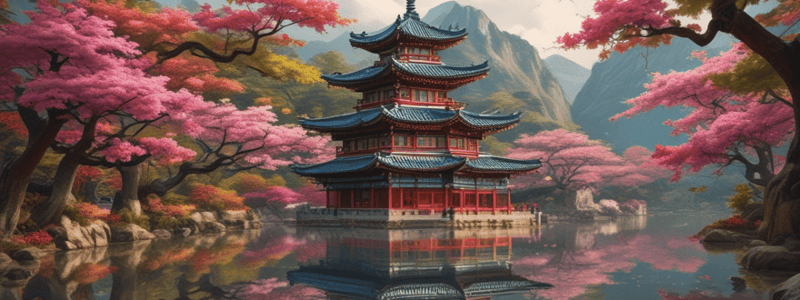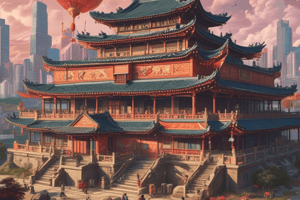Podcast
Questions and Answers
What is the name of the material object produced by an instant camera in the cafe?
What is the name of the material object produced by an instant camera in the cafe?
- Cheki (correct)
- Picprint
- Snap
- Flashy
During 'fun time' at the @home café, what game do the maids challenge everyone to play?
During 'fun time' at the @home café, what game do the maids challenge everyone to play?
- Uno
- Monopoly
- Chess
- Rock-paper-scissors (correct)
What is the significance of 'fun time' at @home café according to the text?
What is the significance of 'fun time' at @home café according to the text?
- It is a time for maids to have a break
- It is a time for customers to order food
- It involves a special game of rock-paper-scissors (correct)
- It is a time for customers to take photographs
What kind of gestures and vocalizations accompany the rock-paper-scissors game during 'fun time'?
What kind of gestures and vocalizations accompany the rock-paper-scissors game during 'fun time'?
How do some regular customers maximize their interaction with the maids in the cafe?
How do some regular customers maximize their interaction with the maids in the cafe?
In what special spot at the cafe does the master pose with a maid for a photograph?
In what special spot at the cafe does the master pose with a maid for a photograph?
What is prohibited during the interaction between masters and maids when taking photographs in the cafe?
What is prohibited during the interaction between masters and maids when taking photographs in the cafe?
Who else besides the master and maid is involved in the interaction during the photograph session at the cafe?
Who else besides the master and maid is involved in the interaction during the photograph session at the cafe?
'Fun time' at @home cafe implies which of the following according to the text?
'Fun time' at @home cafe implies which of the following according to the text?
'Moe moe kyun ritual' involves special gestures and vocalizations related to which activity?
'Moe moe kyun ritual' involves special gestures and vocalizations related to which activity?
What was the primary focus of the copyright law in Japan during the 1930s?
What was the primary focus of the copyright law in Japan during the 1930s?
Which of the following was not a characteristic of the development of popular music in Japan during 1945-1970?
Which of the following was not a characteristic of the development of popular music in Japan during 1945-1970?
What was the significance of the electric guitar in the development of Japanese popular music?
What was the significance of the electric guitar in the development of Japanese popular music?
What was the primary characteristic of the rockabilly genre that emerged in Japan?
What was the primary characteristic of the rockabilly genre that emerged in Japan?
What is the significance of the enka genre in Japanese popular music?
What is the significance of the enka genre in Japanese popular music?
What is the significance of the "kata" in the structure of enka music?
What is the significance of the "kata" in the structure of enka music?
What is the significance of the enka singer Jero in the context of the genre?
What is the significance of the enka singer Jero in the context of the genre?
Which of the following is not a characteristic of the enka genre as described in the text?
Which of the following is not a characteristic of the enka genre as described in the text?
What is the primary purpose of the text provided?
What is the primary purpose of the text provided?
Aidoru refers to teenage singers in Japan who are up to 16 years old.
Aidoru refers to teenage singers in Japan who are up to 16 years old.
The term 'J-pop' encompasses all popular music genres in Japan, including enka.
The term 'J-pop' encompasses all popular music genres in Japan, including enka.
Japanese hip hop is accused of being a direct copy of Anglophonic hip hop.
Japanese hip hop is accused of being a direct copy of Anglophonic hip hop.
Aidoru singers focus more on their ability to communicate through talking rather than singing.
Aidoru singers focus more on their ability to communicate through talking rather than singing.
Boys in Japan are primarily sold 'power' by Aidoru singers.
Boys in Japan are primarily sold 'power' by Aidoru singers.
The term 'Aidoru' first appeared in the 1970s to describe young singers.
The term 'Aidoru' first appeared in the 1970s to describe young singers.
J-pop includes genres like J-rock and Visual kei, excluding hip hop.
J-pop includes genres like J-rock and Visual kei, excluding hip hop.
Imitation is not a culturally valued style of learning in Japanese music.
Imitation is not a culturally valued style of learning in Japanese music.
'Aidoru' singers aim to create an image of being both a close buddy and a distant figure at the same time.
'Aidoru' singers aim to create an image of being both a close buddy and a distant figure at the same time.
Anarchy was a significant year for the development of popular music in Japan.
Anarchy was a significant year for the development of popular music in Japan.
What are the psychological and behavioral effects of kawaii according to Nittono (2016)?
What are the psychological and behavioral effects of kawaii according to Nittono (2016)?
What is the concept of 'amae' in Japanese culture?
What is the concept of 'amae' in Japanese culture?
Describe the characteristics of kawaii objects/characters according to K.Barancovaitė-Skindaravičienė.
Describe the characteristics of kawaii objects/characters according to K.Barancovaitė-Skindaravičienė.
What are yuru-kyara and how are they used in Japan?
What are yuru-kyara and how are they used in Japan?
When were yuru-kyara first introduced and what was the first yuru-kyara?
When were yuru-kyara first introduced and what was the first yuru-kyara?
What are some features of yuru-kyara characters?
What are some features of yuru-kyara characters?
What is the cultural value of ō-gata in Japanese culture?
What is the cultural value of ō-gata in Japanese culture?
What is 'chizimi shikō' in relation to kawaii?
What is 'chizimi shikō' in relation to kawaii?
What is the significance of the imperfections and helplessness of kawaii characters?
What is the significance of the imperfections and helplessness of kawaii characters?
Explain the concept of 'Yurui kyarakutaa' and its role in Japanese culture.
Explain the concept of 'Yurui kyarakutaa' and its role in Japanese culture.
Kawaii is not just an aesthetic in Japan. It is a ______ philosophy of life
Kawaii is not just an aesthetic in Japan. It is a ______ philosophy of life
Kawaii has two aspects: one is an aspect of feeling and another is an aspect of ______ value
Kawaii has two aspects: one is an aspect of feeling and another is an aspect of ______ value
Psycho-physical kawaii attributes include round shape, pink, orange, yellow, green colors, soft and fluffy materials, and ______ size
Psycho-physical kawaii attributes include round shape, pink, orange, yellow, green colors, soft and fluffy materials, and ______ size
Cultural kawaii styles include Lolita, Gal, and similar ______ styles
Cultural kawaii styles include Lolita, Gal, and similar ______ styles
Kimo-kawaii is described as 'creepy ______'
Kimo-kawaii is described as 'creepy ______'
Yume-kawaii is related to ______
Yume-kawaii is related to ______
Busu-kawaii is related to 'ugly ______'
Busu-kawaii is related to 'ugly ______'
Guro-kawaii is related to ______
Guro-kawaii is related to ______
K.Barancovaitė-Skindaravičienė discusses 12 __________ dispositions: 1) Celebratory; 2) Compliant; 3) Hostile; 4) Apologetic; 5) Deferential; 6) Defensive; 7) Vulnerable; 8) Distant; 9) Refusing; 10) Analytical; 11) Dismissive; 12) Ironic.
K.Barancovaitė-Skindaravičienė discusses 12 __________ dispositions: 1) Celebratory; 2) Compliant; 3) Hostile; 4) Apologetic; 5) Deferential; 6) Defensive; 7) Vulnerable; 8) Distant; 9) Refusing; 10) Analytical; 11) Dismissive; 12) Ironic.
What are some factors that can influence the audience's response? Social background, social position, geographical location, gender, sexual orientation, individual/collective __________ consumption.
What are some factors that can influence the audience's response? Social background, social position, geographical location, gender, sexual orientation, individual/collective __________ consumption.
K.Barancovaitė-Skindaravičienė discusses the preferred message in images and possible responses of the audience. How would these responses differ according to the audience's age, gender, marital status, income, etc.? These aspects are important for understanding the audience's __________ to the images.
K.Barancovaitė-Skindaravičienė discusses the preferred message in images and possible responses of the audience. How would these responses differ according to the audience's age, gender, marital status, income, etc.? These aspects are important for understanding the audience's __________ to the images.
K.Barancovaitė-Skindaravičienė's work 'OOKU: THE INNER CHAMBERS' is referenced in the text. This work may provide insights into contemporary __________ culture.
K.Barancovaitė-Skindaravičienė's work 'OOKU: THE INNER CHAMBERS' is referenced in the text. This work may provide insights into contemporary __________ culture.
Milestone and A. Meyer's book 'Gender and Popular Culture' explores the intersection of gender and __________ in popular culture.
Milestone and A. Meyer's book 'Gender and Popular Culture' explores the intersection of gender and __________ in popular culture.
J. Butler's book 'Gender Trouble' delves into the complexities of gender and societal __________.
J. Butler's book 'Gender Trouble' delves into the complexities of gender and societal __________.
R. Gill's work 'Gender and the Media' investigates the role of gender in the context of __________ representations.
R. Gill's work 'Gender and the Media' investigates the role of gender in the context of __________ representations.
E. Goffman's 'The Presentation of Self in Everyday Life' examines how individuals construct and present their __________ identities.
E. Goffman's 'The Presentation of Self in Everyday Life' examines how individuals construct and present their __________ identities.
During the WW2: propaganda anime "Momotarō no Umiwashi (1943) and Momotarō: Umi no Shinpei (1945) were created to serve as a form of ______
During the WW2: propaganda anime "Momotarō no Umiwashi (1943) and Momotarō: Umi no Shinpei (1945) were created to serve as a form of ______
Manga studies at Kyoto Seika University, Faculty of Manga focus on the management of intellectual property rights and how to maintain cultural ownership of the increasingly hybrid manga and anime ______
Manga studies at Kyoto Seika University, Faculty of Manga focus on the management of intellectual property rights and how to maintain cultural ownership of the increasingly hybrid manga and anime ______
Anime origins date back to the 20th century with the concept of kamishibai, and during WW2, propaganda anime like "Momotarō no Umiwashi" were used as a form of ______
Anime origins date back to the 20th century with the concept of kamishibai, and during WW2, propaganda anime like "Momotarō no Umiwashi" were used as a form of ______
According to K.Barancovaitė-Skindaravičienė, the principle of contradiction in Japanese culture is based on the coexistence of tradition and modernity, different and familiar, conservative and ______
According to K.Barancovaitė-Skindaravičienė, the principle of contradiction in Japanese culture is based on the coexistence of tradition and modernity, different and familiar, conservative and ______
K.Barancovaitė-Skindaravičienė discusses the exoticism of Japan through popular culture, highlighting the paradox of Japanese culture that is based on the principle of ______
K.Barancovaitė-Skindaravičienė discusses the exoticism of Japan through popular culture, highlighting the paradox of Japanese culture that is based on the principle of ______
Japanese anime became popular in the West since the 1960s, showcasing the cultural exchange between Japan and the ______
Japanese anime became popular in the West since the 1960s, showcasing the cultural exchange between Japan and the ______
The three main areas of concern regarding manga's effect on Japanese society include: too much information provided in manga format, treating information as a tool for creating appeal, and the negative impact of violent and sexually explicit manga on young ______
The three main areas of concern regarding manga's effect on Japanese society include: too much information provided in manga format, treating information as a tool for creating appeal, and the negative impact of violent and sexually explicit manga on young ______
The editorial team responsible for manga creation consists of 3-7 editors, each overseeing about 20 artists, showcasing active collaboration in the manga creation ______
The editorial team responsible for manga creation consists of 3-7 editors, each overseeing about 20 artists, showcasing active collaboration in the manga creation ______
Kawaii is a concept that can be translated to mean 'pretty', 'sweet', 'cute', 'adorable', and also connotatively as 'humble', 'embarrassed', 'pitiful', 'vulnerable', 'soft', 'tiny', 'attractive'. Some related words include sunaoni (obedient), enryogachi (reserved), kodomoppoi (childish), mujaki (innocent), and musekinin (irresponsible). The derivative 'kawaisoo' means _________.
Kawaii is a concept that can be translated to mean 'pretty', 'sweet', 'cute', 'adorable', and also connotatively as 'humble', 'embarrassed', 'pitiful', 'vulnerable', 'soft', 'tiny', 'attractive'. Some related words include sunaoni (obedient), enryogachi (reserved), kodomoppoi (childish), mujaki (innocent), and musekinin (irresponsible). The derivative 'kawaisoo' means _________.
According to the Nihon kokugo daijiten, the term 'kawaii' can mean various things. It can describe something that looks miserable and raises sympathy, pitiable, pathetic, piteous. It can also refer to something attractive, cannot be neglected, cherished, beloved. Additionally, it can imply that something has a sweet nature, is lovely, adorable, attractive, innocent, obedient, and touching. Moreover, it can describe things and shapes that are attractively small, small, and beautiful. In short, 'kawaii' encompasses a range of meanings from pitiable to _________.
According to the Nihon kokugo daijiten, the term 'kawaii' can mean various things. It can describe something that looks miserable and raises sympathy, pitiable, pathetic, piteous. It can also refer to something attractive, cannot be neglected, cherished, beloved. Additionally, it can imply that something has a sweet nature, is lovely, adorable, attractive, innocent, obedient, and touching. Moreover, it can describe things and shapes that are attractively small, small, and beautiful. In short, 'kawaii' encompasses a range of meanings from pitiable to _________.
The concept of 'kawaii' extends beyond just physical appearance. It can also describe behavior and personality traits. For instance, individuals who exhibit traits like innocent, obedient, touching, and even reserved can be considered _________.
The concept of 'kawaii' extends beyond just physical appearance. It can also describe behavior and personality traits. For instance, individuals who exhibit traits like innocent, obedient, touching, and even reserved can be considered _________.
In Japanese culture, the word 'kawaii' can be applied to not only people but also to objects and shapes. Things that are attractively small and beautiful can be described as _________.
In Japanese culture, the word 'kawaii' can be applied to not only people but also to objects and shapes. Things that are attractively small and beautiful can be described as _________.
Kawaii characters, especially in the context of Japanese pop culture, are often portrayed as _________, innocent, obedient, and touching.
Kawaii characters, especially in the context of Japanese pop culture, are often portrayed as _________, innocent, obedient, and touching.
The term 'kawaisoo', which is a derivative of 'kawaii', can be translated to mean ________, poor, pitiable.
The term 'kawaisoo', which is a derivative of 'kawaii', can be translated to mean ________, poor, pitiable.
In Japanese culture, the concept of 'kawaii' goes beyond just physical appearance. It also signifies certain behaviors and traits such as being ________, innocent, obedient, and touching.
In Japanese culture, the concept of 'kawaii' goes beyond just physical appearance. It also signifies certain behaviors and traits such as being ________, innocent, obedient, and touching.
Kawaii characters are often depicted as ________, innocent, obedient, and touching.
Kawaii characters are often depicted as ________, innocent, obedient, and touching.
Japanese cultural export started in the 1980s, when the West started studying Japanese corporate culture. Since the 1990s, there has been international interest in Japanese popular culture including manga, anime, fashion, popular music, movies, computer games, and everyday lifestyle. In the 2000s, initiatives for the Cool Japan campaign were introduced. Since 2006, there has been an official trend of pop diplomacy carried out by the Japanese ______.
Japanese cultural export started in the 1980s, when the West started studying Japanese corporate culture. Since the 1990s, there has been international interest in Japanese popular culture including manga, anime, fashion, popular music, movies, computer games, and everyday lifestyle. In the 2000s, initiatives for the Cool Japan campaign were introduced. Since 2006, there has been an official trend of pop diplomacy carried out by the Japanese ______.
First initiatives for promoting Japanese popular culture policies began in 2002 when Prime Minister Koizumi proposed a policy of intellectual property-based nation, which included the strategic development of the contents industry. The term 'contents' includes movies, animated cartoons, game software, etc. In 2005, the Copyright Law focused on the commercial value of 'characters.' In 2006, Prime Minister Abe initiated the cultural industry strategy to promote popular culture. In 2010, The Ministry of Economy, Trade and Industry established a new Creative Industries Promotion Office. In 2013, the Japanese government launched the so-called 'Cool Japan Fund' to support advertising and public relations of Japan’s creative industries overseas. The aim is to create the image of Japan as a peaceful nation that loves beauty, enjoys a spirit of harmony, and coexists with ______.
First initiatives for promoting Japanese popular culture policies began in 2002 when Prime Minister Koizumi proposed a policy of intellectual property-based nation, which included the strategic development of the contents industry. The term 'contents' includes movies, animated cartoons, game software, etc. In 2005, the Copyright Law focused on the commercial value of 'characters.' In 2006, Prime Minister Abe initiated the cultural industry strategy to promote popular culture. In 2010, The Ministry of Economy, Trade and Industry established a new Creative Industries Promotion Office. In 2013, the Japanese government launched the so-called 'Cool Japan Fund' to support advertising and public relations of Japan’s creative industries overseas. The aim is to create the image of Japan as a peaceful nation that loves beauty, enjoys a spirit of harmony, and coexists with ______.
In 2002, Prime Minister Koizumi proposed a policy of intellectual property-based nation, which included the strategic development of the contents industry. The term 'contents' includes movies, animated cartoons, game software, etc. This initiative aimed to promote Japan as a 'Gross-National ______.'
In 2002, Prime Minister Koizumi proposed a policy of intellectual property-based nation, which included the strategic development of the contents industry. The term 'contents' includes movies, animated cartoons, game software, etc. This initiative aimed to promote Japan as a 'Gross-National ______.'
In 2005, the Copyright Law was introduced with the center of attention being the commercial value of 'characters.' This highlighted the importance of protecting the intellectual property rights of various character-based creations within Japanese popular ______.
In 2005, the Copyright Law was introduced with the center of attention being the commercial value of 'characters.' This highlighted the importance of protecting the intellectual property rights of various character-based creations within Japanese popular ______.
In 2006, Prime Minister Abe initiated the cultural industry strategy to promote popular culture. This strategic move aimed to enhance the global presence and appeal of Japanese ______.
In 2006, Prime Minister Abe initiated the cultural industry strategy to promote popular culture. This strategic move aimed to enhance the global presence and appeal of Japanese ______.
In 2010, The Ministry of Economy, Trade and Industry established a new Creative Industries Promotion Office. This office was created to support and boost the growth of Japan’s creative industries, especially in the realm of popular ______.
In 2010, The Ministry of Economy, Trade and Industry established a new Creative Industries Promotion Office. This office was created to support and boost the growth of Japan’s creative industries, especially in the realm of popular ______.
In 2013, the Japanese government launched the so-called 'Cool Japan Fund' to support advertising and public relations of Japan’s creative industries overseas. The main objective of this fund was to enhance the global visibility and reputation of Japan’s creative industries and promote the concept of 'Cool ______.'
In 2013, the Japanese government launched the so-called 'Cool Japan Fund' to support advertising and public relations of Japan’s creative industries overseas. The main objective of this fund was to enhance the global visibility and reputation of Japan’s creative industries and promote the concept of 'Cool ______.'
The aim of the Japanese government's initiatives for promoting Japanese popular culture policies is to create the image of Japan as a peaceful nation that loves beauty, enjoys a spirit of harmony, and coexists with ______.
The aim of the Japanese government's initiatives for promoting Japanese popular culture policies is to create the image of Japan as a peaceful nation that loves beauty, enjoys a spirit of harmony, and coexists with ______.




